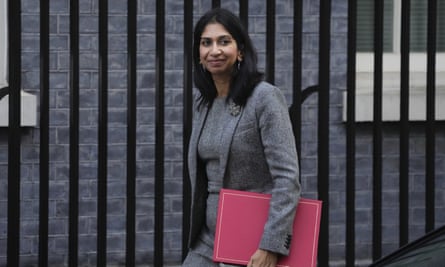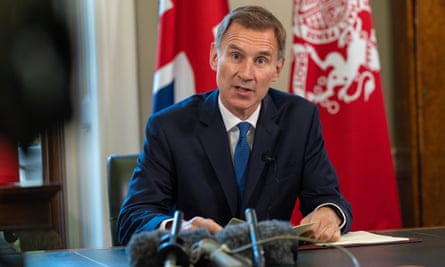The plunging pound had not done it. The wholesale dumping of a budget did not do it. A complete collapse in party discipline that led to MPs cursing colleagues and others sobbing did not do it. Even the resignation of Liz Truss, making her Britain’s shortest serving prime minister by some distance, was not enough.
Yet as allies of Boris Johnson immediately let it be known that he was planning to stand for party leader again, just minutes after Truss had retreated into Downing Street at the end of her humiliating resignation speech, a Tory MP with long-lasting doubts about the party’s direction said they were now finally contemplating their future within it.
“If Boris wins, all bets are off,” they said. “Defections, people resigning the whip. It’s all on the table now. I’m starting to realise that I have so little in common with a large number of colleagues.”
In the crisis-ridden psychodrama that British politics has become, perhaps the prospect of Johnson’s return should have been the obvious next step after Truss’s devastating demise.
But several MPs said that it would simply lead to splits and the collapse of the government and the Conservative party – and could even be the one thing that could precipitate a general election that would be, in all likelihood, devastating for the Tories.
According to one cabinet member, the lobbying campaign for Johnson was “very quick and very aggressive”. Senior figures were contacted with the view of having as many public supporters as possible early on in the race, to convince waverers that it was now plausible to think the unthinkable and bring back a leader ditched just months earlier for being incapable of avoiding scandal and crises.
Every tactic was used to get an early bump in support that would create a sense of momentum. “Possibles” were told that Johnson was prepared to bring back key figures into a cabinet such as old foes Michael Gove and leadership rival Rishi Sunak.
Things would be different, with new staff and a new culture in No 10. The campaign was also from the ground up. Johnson already had a built-in advantage among members because of the drive that had been spearheaded by Tory donor Peter Cruddas since Johnson’s removal in the summer.
Cruddas had mounted a campaign to have Johnson reinstated or allowed to run again – and with it developed a network of passionate members fighting for the former prime minister.
Some MPs have reported that has led to lobbying at a local level for them to “back Boris”. Reports have also emerged that deselection is being dangled should they fail to comply.
The early shock and awe attempt was an essential element of making the Johnson saga once again the central question to the future of the Conservative party and the country.
By Friday morning, it was serving its purpose. Yet such has been the dizzying ebb and flow of the race to replace Truss that by the time Johnson was boarding a flight home from the Dominican Republic – with the boos from some passengers an early reminder of the divisions he will bring with him – there were concerns among his supporters that the momentum was ebbing.
By Friday afternoon, he was stuck on the halfway line, with about 50 MP backers. Allies were telling him it was the wrong time to attempt a comeback. Sources familiar with the Commons privileges committee into whether he misled MPs over Partygate were saying the investigation could well “finish him off”.

Photograph: Kin Cheung/AP
By the time his delayed flight hit the Gatwick tarmac shortly after 10am on Saturday morning, Johnson was fighting to keep alive the dream of a swift and jaw-dropping return.
Key now was the support of the right of the party, who had struggled to find a candidate, with Suella Braverman, whose shock departure from the cabinet earlier in the week is now a mere footnote in Britain’s political chaos, unable to secure enough supporters. The backing of former home secretary Priti Patel on Saturday morning was enough to keep his supporters going.
But with Johnson scrambling, Sunak – planning his campaign from his rural North Yorkshire constituency – was already sure he had the support of the 100 MPs needed to enter the race.
The third figure in the running, Penny Mordaunt, was also struggling. Her backers knew, however, that her fate was tied up with Johnson’s – she had the capacity to keep him out of the race with enough supporters. Yet should Johnson drop out, she could inherit the anti-Sunak mantle that had helped deliver victory for Truss just weeks earlier. And all the while, the Tory melodrama continued to drive the fate of the country.
With the breathless speed with which the race to find a new Tory leader has unfolded, it can be easy to forget that halfway through the week, Britain lost its latest prime minister in record time. The fall of Truss came so fast that even 24 hours before her robotic resignation statement on Thursday, many MPs and insiders had been working on the basis that they had a couple of weeks left to ensure that the succession could be sorted out. While Truss and her team had been dreading prime minister’s questions, she managed to get through without an implosion. It was not a good outing – she had undermined chancellor Jeremy Hunt by committing to protect the pensions triple lock and bizarrely quoted Peter Mandelson by saying she was “a fighter, not a quitter” (Mandelson twice had to resign from the government). However, given how low expectations had fallen, the session had not caused a terminal problem.
As late as Wednesday afternoon, you could still find MPs who thought Truss was finished, but could even last as long as May’s local elections. Others were talking about Christmas, while the hawkish were aiming to get the medium-term fiscal plan out of the way on 31 October.
Ministers were shocked by the resignation of Braverman, with one cabinet source instantly pointing to it as “the beginning of the end”. The appointment of Grant Shapps in her place, a man who had been logging sentiment against the prime minister days earlier, was a symbol that Truss was no longer in charge of cabinet appointments, let alone the government. Yet still there were some saying she could be kept in place until a more convenient time.
It was, in the end, the botched handling of a Labour vote on fracking that pushed many MPs over the edge. Labour officials could scarcely believe their luck when a message emerged from the Tory deputy whip Craig Whittaker that their motion was being treated as a confidence vote in the government.
Throughout the day, Tory MPs facing huge local pressure over fracking began making it clear they would happily lose the party whip rather than back the government on the issue.
The peak of the chaos is hard to fathom, but it was probably witnessed in the House of Commons voting lobbies at about 7pm on Wednesday. As the fracking debate came to an end and climate minister Graham Stuart said that the vote was no longer being regarded as a confidence motion, chief whip Wendy Morton was seen leaving. Moments later, with MPs confused over what on earth they were meant to be doing, there were confrontations and reports of skirmishes. When one MP asked Morton how they were meant to vote, several witnesses said she replied: “I don’t know. I’m no longer the chief whip.”
An MP who saw the exchange said: “It was total chaos.” A former cabinet minister watching the scene said: “They can’t liaise with ministers – they can’t run things. This has to end. The party is being humiliated but, more importantly, so is the country.”
Back in the lobbies, some Tory MPs were brought to tears, being consoled by Labour MPs. Stuart was informed his closing speech had “finished off” the chief whip. Meanwhile, Whittaker, who had the task of getting MPs into line, was heard making the outburst: “I am fucking furious and I don’t give a fuck any more.” The phrase was reported around the world as a sign of the apparent state of the British government.
As the pressure increased, other MPs said Truss was seen racing after Morton, losing her security detail in the process. It culminated in a 45-minute meeting in the Tory whips’ office. Eventually, the two whips had unresigned, with a 1.30am briefing from Downing Street that MPs would be disciplined for failing to back the government in the vote. As one veteran from the Brexit wars era noted: “They’re making Theresa May look like Winston fucking Churchill.”
In the middle of it all, there was also a hidden war going on among Downing Street officials, seemingly without Truss being able to control it. A blame game was taking place over a briefing against Sajid Javid the previous weekend, with a quote from a Downing Street source dismissing the idea that Javid had been offered the job as chancellor, adding that the prime minister thought he was “shit”.
On Sunday, Truss had repeatedly tried to contact Javid to apologise for the briefing. When the pair finally spoke, Javid is said to have insisted that the perpetrator was fired. Truss said that she could not do that. However, on Wednesday, as prime minister’s questions began and Javid was scheduled to ask a hostile question about the briefing and destabilise Truss yet further, it was announced that senior aide Jason Stein had been suspended over the issue and was being investigated.
This announcement was made, said insiders, without Truss’s knowledge, by another Downing Street aide. Discipline had not only been lost within the party. It had disintegrated in the rooms surrounding Truss’s Downing Street office. Stein was reinstated later in the week.
While a botched party management might seem an obscure reason to ditch a prime minister, to many wavering MPs it was a sign that Truss’s status as the least powerful figure in her own government had made the whole enterprise of governing unsustainable.
Many had previously disregarded the idea of sending a letter of no confidence to Sir Graham Brady, chairman of the backbench 1922 Committee. In theory, Truss was protected from a confidence vote in her leadership for a year. But now, many decided Brady needed the ammunition of letters in his inbox.

This mayhem all unfolded after Hunt had already held a televised address on Monday effectively killing off the mini-budget that had triggered Britain’s economic turmoil – and with it, he finished off Truss’s leadership pitch and any reason she had to continue.
Later that day, some MPs thought Truss had decided to resign when Commons leader Mordaunt filled in for her at the dispatch box. In fact, Mordaunt would only ensure Truss had no way back by insisting the prime minister was “not under a desk”. When Truss did appear alongside Hunt later, she had a fixed, trance-like stare.
Part of the unfathomable absurdity that has unfolded since Truss’s resignation is the way in which the next prime minister will be decided. While there was no agreement on who should take over, the majority of Tory MPs had been in agreement since their party conference that any process to replace Truss must not be put to the members. In the atmosphere of crisis and with the markets watching, they needed someone who could command the support of most MPs.
Yet somehow, to the consternation of many MPs, a process emerged that would see the two final candidates put to a vote of members. The system appears to have developed as a compromise between those wanting a Johnson return and those opposed to it. Many MPs had pressured Brady to ensure that any candidate would need a high threshold of 100 MP backers to make it into the race. This was the “stop Boris” measure.
Meanwhile, MPs point to Conservative party chairman Jake Berry, one of the earliest Johnson backers from the 2016 leadership contest, as the person who pushed for a members’ vote – the former prime minister retains some star billing with the grassroots. The prospect that the contest could once again be decided by party members has led many MPs to conclude the rules now need changing. “The members’ vote doesn’t work,” one said. “It was brought in to include members, but it just lets a load of loons in.” Even if Sunak has a huge lead over Johnson after a final vote of MPs, members would still have the power to foist Johnson upon them.
With the race set up under these rules, Johnson’s team knew the key was somehow reaching the 100 MP threshold. They knew they had to move early and began pressing MPs immediately, including cabinet ministers who might be won over and bring some people with them. Johnson backers were making clear that they understood it would have to be a “very different sort of government”. Johnson himself is said to have been phoning colleagues from his Caribbean holiday – an irony not lost on incredulous MPs opposed to his return.
By Friday, MPs who just months earlier had set out detailed reasons for wanting Johnson out were among those demanding his return.
Stoke-on-Trent North MP Jonathan Gullis, a passionate Johnson backer who then joined the mass resignations three months ago, declared once again that he was supporting him. In his July resignation letter, he said the party had been “more focused on dealing with our reputational damage rather than delivering for the people of this country”.
Sleaford and North Hykeham MP Caroline Johnson also backed Johnson. She had previously resigned as vice chair of the Conservative party, citing the “cumulative effect” of Johnson’s “errors of judgment and domestic actions”.
One senior official from the Johnson years was among those to despair of the spectacle. “They’re clowns,” they said. “And can’t complain if the same shit happens again.”
Meanwhile, some MPs were heading in the other direction. One “red wall” MP who had backed Johnson said his re-emergence was madness, adding: “This should be all about good government and getting barnacles off the boat. We just booted him out because of the shit he caused. Do we seriously expect good governance from him?”
The absurdity of the situation, several Tory MPs warned, was that the return of Johnson is the one thing that could precipitate a general election – the least favoured option by Conservatives, given the party’s poll ratings. One said an election would be accompanied by “the end of the Conservative party”.
As amazing as it sounds, there were no active conversations between Labour and potential Tory defectors by the time Truss resigned. Yet this weekend, some Tories are considering their positions in the party for the first time, saying they could not tolerate life with Johnson as their leader once again. Some are still simply trying to digest exactly what is happening.
“I feel like I’ve been walking around for the last three months on crazy pills,” said one MP. “Lately, I’ve just been going up to people shouting: ‘Do something!’ Our standing isn’t holed below the waterline – it’s below the Mariana Trench. There are no metaphors left to describe what is going on.”
By Saturday morning, with the reality of the difficulties Johnson would face in office sinking in, some long-term backers were urging him not to stand. His former editor Charles Moore wrote that Johnson should “sit this one out”.
Another crucial moment will come on Monday, when the pro-Brexit European Research Group of MPs meets to discuss the leadership. Winning the support of the right is now essential for Johnson, but on its own it is unlikely to get him over the 100 MP threshold.
Meanwhile, Downing Street has become a ghostly building. It is still filled with staff, but the bad blood and the humiliation of Truss’s downfall is felt keenly by all who work there. This weekend, they are preparing their goodbyes and buying farewell gifts. They are preparing for one final prime minister’s questions, should Truss be required to complete that one last time on Wednesday. But one senior Downing Street figure described the atmosphere as “complete despair”.
Some of the staff are now contemplating the return of the man who they had been serving under just months earlier. Some could yet be called to give testimony against him in the privileges committee investigation.
The question they are now pondering is whether they will be giving evidence against their old boss, or their current one.
Read More: World News | Entertainment News | Celeb News
Guardian








